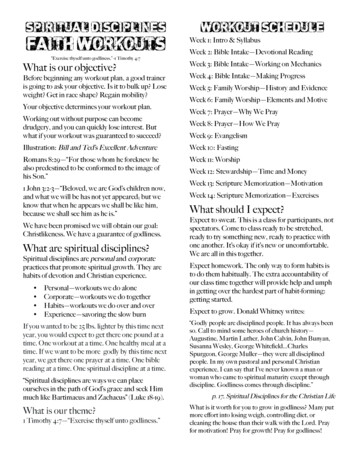
Transcription
Spiritual disciplinesFaith workouts“Exercise thyself unto godliness.” -1 Timothy 4:7Workout scheduleWeek 1: Intro & SyllabusWeek 2: Bible Intake—Devotional ReadingWhat is our objective?Week 3: Bible Intake—Working on MechanicsBefore beginning any workout plan, a good traineris going to ask your objective. Is it to bulk up? Loseweight? Get in race shape? Regain mobility?Week 5: Family Worship—History and EvidenceYour objective determines your workout plan.Working out without purpose can becomedrudgery, and you can quickly lose interest. Butwhat if your workout was guaranteed to succeed?Week 4: Bible Intake—Making ProgressWeek 6: Family Worship—Elements and MotiveWeek 7: Prayer—Why We PrayWeek 8: Prayer—How We PrayWeek 9: EvangelismIllustration: Bill and Ted’s Excellent AdventureWeek 10: FastingRomans 8:29—“For those whom he foreknew healso predestined to be conformed to the image ofhis Son.”Week 11: Worship1 John 3:2-3—“Beloved, we are God’s children now,and what we will be has not yet appeared; but weknow that when he appears we shall be like him,because we shall see him as he is.”We have been promised we will obtain our goal:Christlikeness. We have a guarantee of godliness.What are spiritual disciplines?Spiritual disciplines are personal and corporatepractices that promote spiritual growth. They arehabits of devotion and Christian experience. Personal—workouts we do aloneCorporate—workouts we do togetherHabits—workouts we do over and overExperience—savoring the slow burnIf you wanted to be 25 lbs. lighter by this time nextyear, you would expect to get there one pound at atime. One workout at a time. One healthy meal at atime. If we want to be more godly by this time nextyear, we get there one prayer at a time. One biblereading at a time. One spiritual discipline at a time.“Spiritual disciplines are ways we can placeourselves in the path of God’s grace and seek Himmuch like Bartimaeus and Zachaeus” (Luke 18-19).What is our theme?1 Timothy 4:7—“Exercise thyself unto godliness.”Week 12: Stewardship—Time and MoneyWeek 13: Scripture Memorization—MotivationWeek 14: Scripture Memorization—ExercisesWhat should I expect?Expect to sweat. This is a class for participants, notspectators. Come to class ready to be stretched,ready to try something new, ready to practice withone another. It’s okay if it’s new or uncomfortable.We are all in this together.Expect homework. The only way to form habits isto do them habitually. The extra accountability ofour class time together will provide help and umphin getting over the hardest part of habit-forming:getting started.Expect to grow. Donald Whitney writes:“Godly people are disciplined people. It has always beenso. Call to mind some heroes of church history—Augustine, Martin Luther, John Calvin, John Bunyan,Susanna Wesley, George Whitefield.CharlesSpurgeon, George Muller—they were all disciplinedpeople. In my own pastoral and personal Christianexperience, I can say that I’ve never known a man orwoman who came to spiritual maturity except throughdiscipline. Godliness comes through discipline.”p. 17, Spiritual Disciplines for the Christian LifeWhat is it worth for you to grow in godliness? Many putmore effort into losing weigh, controlling diet, orcleaning the house than their walk with the Lord. Prayfor motivation! Pray for growth! Pray for godliness!
Devotional readingUp and Running“Exercise thyself unto godliness.” -1 Timothy 4:7The core of the spiritual life.“No spiritual discipline is more important than the intake ofGod’s Word. Nothing can substitute for it. There is simply nohealthy Christian life apart from a diet of the milk and meat ofScripture.” –Donald Whitney, Spiritual Disciplines (28).Lifeway Research found in 2017: Only 22% of Americans read their Bible daily1 in 5 have read the whole Bible at least once53% have read little to noneJesus assumed God’s people read God’s word:“Have you not read.?” (Matt. 12:3,5;19:4;22:31)Matthew 4:4—“But Jesus answered, ‘It is written, “Manshall not live by bread alone, but by every word thatcomes from the mouth of God.”’” Step 2: Find a plan.Drop and flop is not much of a reading plan. If yournormal devotional time is a random verse from arandom book each day, it’s no wonder you have ahard time.It is important to mention here that devotionalreading does not mean reading a devotional. That’sa misnomer. We are talking about reading entirebooks of the Bible devotionally.Here are some examples of Bible Reading Plans: 2Timothy 3:16—“All Scripture is breathed out by Godand profitable for teaching, for reproof, for correction,and for training in righteousness.”Revelation 1:3—“Blessed is the one who reads aloud thewords of this prophecy, and blessed are those who hear,and who keep what is written in it, for the time is near.”When we feed our souls with all Scripture we areblessed. So, let’s start working out! Step 1: Find time. The biggest hurdle to daily Bible reading in mostpeople’s minds is finding the time to do it. Butconsider this: The Bible can be read cover-to-cover in 71 hours15 min a day will finish the Bible in a year5 min a day will finish the Bible in 3 yearsThe majority of Christians will never read thewhole Bible through in their lifetime. Is it a timeproblem? Or does it come down to discipline?“A man can no more take in a supply of grace for the futurethan he can eat enough for the next six months, or takesufficient air into his lungs at one time to sustain life for aweek. We must draw upon God’s boundless store of gracefrom day to day as we need it.” –D.L. MoodyTry to make it the same time every day. If possible,try any time other than just before you go to sleep inthe evening: Retention: You’re tired and will retain almostnothing.Impact: You want to encounter Christ in theScriptures when it will still have an impact on yourday! Time-based (aka the Ribbon Thingy Plan)—choose to read for a certain amount of time.Each day, pick up where you left off. That’swhat the ribbon’s for!Length-based—choose to read a certain numberof chapters a day.o 3 chapters a day, 5 on Sundays will finishthe Bible in a year.o Begin in Genesis, Job, and Matthew,read one chapter from eacho Choose a book and read through it.When you finish, put a checkmark nextto it in the Table of ContentsM’cheyne Reading Plan—make it through theOT once and the NT and Psalms twice in a yearChronological Reading Plan—Read the Biblein the order the events took place, as best aseditors can surmise.Find even more plans ato ligonier.org/blog/bible-reading-plansStep 3: Find a word or verse formeditation.We will look at meditation more next week.However, as you read, look for a verse or even asingle word that grabs your attention. Dwell on it;think about it; pray over it. Ask the Lord what he isshowing you about himself and about yourself.Remember our objective: we are aiming forgodliness. We are not simply reading for the sake ofreading or in order to check a box on a list. Seek theLord in his Word.Let the blind, handless man from Kansas City bemotivating—he’s read the Bible multiple times inbraille.with his tongue. What’s stopping you?
Devotional readingWorking on our mechanics“Exercise thyself unto godliness.” -1 Timothy 4:7Let’s workout together—to start our class, let’s take10 minutes to do some devotional reading.Getting more from your workout.When an athlete wants to improve theirperformance, they will often take a closer look attheir mechanics, the specific ways they do a certainmovement or action.When we are reading the Bible, there are two kindsof mechanics that can help us improve our timewith the Lord.Work on your study.The Bible is filled with examples of godly men andwomen who knew spent time studying their Bibles:Ezra 7:10—“For Ezra had set his heart to study the Law of theLORD, and to do it and to teach his statutes and rules inIsrael.”Acts 17:11—“Now these Jews were more noble than those inThessalonica; they received the word with all eagerness,examining the Scriptures daily to see if these things were so.”Have you ever tried to sit down and outline achapter of the Bible? Of a book? Have you tracedan argument of Paul or looked into the crossreferences on the margin of your page? Why do sofew Christians devote time to studying the Bible?“Here then, is the real problem of our negligence. We fail inour duty to study God’s Word not so much because it isdifficult to understand, not so much because it is dull andboring, but because it is work. Our problem is not a lack ofintelligence or a lack of passion. Our problem is that we arelazy.” –R.C. SproulIn his book Spiritual Disciplines, Donald Whitneyexplains that there is nothing magical about study—“The basic difference between Bible reading andBible study is simply a pencil and a piece of paper.”Here are some basic things you can do in order tostudy a passage: Write down anything that sticks out—things youunderstand, questions you have, connections you see.Look up the cross-references and see what meaningthey add to the passage.Find a meaningful word and look it up in theconcordance to find other verses that use that word.Try to outline a chapter.As tempting as it is, especially with a Study Bible,“Don’t settle only for spiritual food that’s been‘predigested’ by others. Experience the joy ofdiscovering biblical insights firsthand!”Work on your meditation.Meditation? Isn’t that some kind of Buddhist, NewAge, yoga mat mumbo-jumbo? Biblical meditationis not emptying your mind, but filling it withthoughts of God and his truth.Consider this definition of meditation:“Deep thinking on truths and spiritual realities in Scripture forthe purposes of understanding, application, and prayer.”Look at Joshua 1:8 and Psalm 1:1-3. Both promisesuccess and flourishing are results of meditating onGod’s Word. So how do we do it?Step 1: Select a verse, phrase, or word Choose something that sticks out from yourdevotional reading.Find a verse that speaks to your presentcircumstances or struggle.Step 2: Repeat it differently. Example: John 11:25“I am the resurrection and the life.”“I am the resurrection and the life.”“I am the resurrection and the life.”“I am the resurrection and the life.”“I am the resurrection and the life.”“I am the resurrection and the life.”“I am the resurrection and the life.”Step 3: Write it in your own words.Step 4: Think of ways to apply the verse. “God wants you to find an application whenever youcome to the Scriptures.open the Book expectantly.”Step 5: Pray the verse and its promises. What words strengthen your faith? Thank the Lordfor them.What is the Holy Spirit prompting you to tell theLord through this verse?Step 6: Slow down. Weight lifters limit their muscle growth when theytry to hurry through their workout with badmechanics. In our fast-paced world, we do the sameto our spiritual growth when we don’t enjoy thefreedom to read slowly.Have you failed in your good intentions this pastweek? Remember Paul’s encouragement:“Forgetting what lies behind and straining forwardto what lies ahead, I press on.” (Phil. 3:13-14a)
Devotional readingMaking progress“Exercise thyself unto godliness.” -1 Timothy 4:7How is your first discipline coming along? Are youmaking progress? Let’s spend the first 10 minutesdoing some devotional reading.The necessity of application.As we grow in our discipline to be in God’s Word,it is important for us to remember the purpose ofour discipline: godliness. If we are daily reading theBible with no intention to be changed by it, what isthe point?“I’ve known people in as many as six Bible studies per weekwho grew only in knowledge but not in Christlikenessbecause they were not applying what they were learning.” –Donald Whitney, Spiritual Disciplines (61)Read James 1:22-25. Is there any benefit to beingonly a hearer of the Word and not a doer as well?Consider Jesus’s words in John 13:17—“If you knowthese things, blessed are you if you do them.”Progress comes by application.lived in the time when it was written; but if you intend toprofit by the word, bring it home to yourselves: a medicinewill do no good, unless it be applied.” –Thomas WatsonThe immense help of journaling.If you go into a gym, you will notice that manypeople carry around a journal. In it, you will findrecords of past workouts, routines they want to try,and motivational material. People who workout outrecognize the value of journaling their experience.“As a Christian, your journal is a place to record the works andways of God in your life. Your journal also can include anaccount of daily events, a diary of personal relationships, anotebook of insights into Scripture, and a list of prayerrequests.A journal is one of the best places for charting yourprogress in the other Spiritual Disciplines and for holdingyourself accountable to your goals.” (206)Many portions of Scripture read like journalentries: Lamentations, several of the Psalms, thebook of Nehemiah.Journaling can help your progress.In self-understanding. (Romans 12:3)Journaling can help you observe patterns in your life you’ve notseen before: “When I review my journal entries for a month,six months, a year, I see myself and events more objectively.”“Because God wills for you to be a doer of His Word, you maybe confident that He wants you to find an applicationwhenever you come to the Scriptures.open the bookexpectantly.” (57)In meditation.When we talk about application, we are seeking tograsp the reality the words are communicating. It isthis reality—the story of the gospel, the nature ofGod and his work—that then shapes how we live.In expressing your thoughts and feelings to theLord. (Psalm 62:8)Seek to respond in specific ways to what you haveread. It might be helpful to ask application-orientedquestions. In view of what I have read. What should I believe about God?How can I praise or thank or trust God?What should I pray for?How can I change my attitude?Does this effect a decision I have to make?Is there something specific I should do for the sake ofChrist, others, or myself today?Always look for specific ways to apply what theLord is speaking to you:“Take every word as spoken to yourselves. When the wordthunders against sin, think thus: ‘God means my sins;’ when itpreseth any duty, ‘God intends me in this.’ Many put offScripture from themselves, as if it only concerned those who“Without a pen in hand, I can get so distracted inmeditation.” (208)“A journal is a place where we can give expression to thefountain of our heart, where we can unreservedly pour out ourpassion before the Lord.” (209)“It is our shame to be so cold, unfeeling and unemotional inspite of all that God has done to us and for us in Christ.Thekeeping of a diary might help put us right in this respect.”–Maurice RobertsIn remembering the Lord’s works. (Psalm 77:11-12)In creating and preserving a spiritual heritage.(Psalm 102:18)“We may never know the future spiritual impact of somethingwe write today.Never underestimate the power of a writtenrecord of faith acting as a spiritual time capsule.” (212)Illustration: The Life and Diary of David BrainerdIn monitoring goals and priorities“As with all the Disciplines, you must start journaling beforeyou can experience its value.” (220)
Family WorshipEvidence and history“Fathers, do not provoke your children to anger, but bring them up in thediscipline and instruction of the Lord.” -Ephesians 6:4What is family worship anyway? Whose job is it toeducate and train our children in the scripture andspiritual truths? Who do you think is doing themajority of this spiritual training in todaysChristian homes? Does anyone have a personaltestimony of how family worship (or familydevotions) may have impacted you? Is thereevidence in scripture that would suggest thatFamily Worship is in fact a spiritual discipline?Here are a few passages that weought to consider:v Genesis 18:17-19§Children & household to keep the way of the Lordv Deuteronomy 6:4-7§Teach the word to your sons diligentlyv Joshua 24:15§My house will serve the Lordv Psalms 78:1-8§Don’t conceal the word from your childrenv Proverbs 22:6§Train up a child in the way he should gov Ephesians 6:4§Bring them up in the discipline & instructionv 1 Timothy 3:4-5§Manage the household in preparation to manage thechurchFamily worship in church historyWho are some of the great heroes of the church?How about these gentlemen for starters?Martin Luther (1483-1546)“Abraham had in his tent a house of God and a church, just astoday any godly any pious head of a household instructs hischildren in godliness. Therefore such a house is actually aschool and church, and the head of the household is a bishopand priest in his house.”Matthew Henry (1662-1714)“If therefore our houses be houses of the Lord, we shall forthat reason love home, reckoning our daily devotion thesweetest of our daily delights; and our family-worship themost valuable of our family-comforts A church in the housewill be a good legacy, nay, it will be a good inheritance, to beleft to your children after you.”Jonathan Edwards (1703-1758)According to biographer George Marsden: “Began the daywith private prayers followed by family prayers, by candlelightin winter Care for his children’s souls was, of course, hispreeminent concern. In morning devotions he quizzed themon scripture with questions appropriate to their ages eachmeal was accompanied by household devotions, and at theend of each day Sarah joined him in his study for prayers.”Charles Spurgeon (1834-1892)“If we want to bring up a godly family, who shall be a seed toserve God when our heads are under clods of the valley, let usseek to train them up in the fear of God by meeting togetheras a family for worship.”Confessions of FaithWestminster Confession of Faith & SecondLondon Confession of 1689“God is to be worshipped everywhere in spirit and intruth; as in private families daily, and in secret each oneby himself.”Baptist Faith and Message (Adopted by theSouthern Baptist Convention June 14th, 2000)Article XVIII – “Parents are to teach their childrenspiritual and moral values and to lead them, throughconsistent lifestyle example and loving discipline, tomake choices based on biblical truth.”Commentary on Article XVIII “From the beginning, God has used the family as theprimary classroom and as the foremost object lesson forteaching His people about Himself and for challengingthem to the holy lifestyle He demands The family is thenatural setting for molding and nurturing a child in theways of the Lord (Prov. 22:6). Parents are admonishedto take seriously their responsibility for the spiritualformation of their children by introducing them to God(salvation) and teaching them His Word (discipleship).”Ok, so where do I go from here?Take some time this week to pray about what Godis calling you to do in your homes regarding familyworship. If you are already having family worship inyour home please come prepared to share what youcurrently do as an encouragement to the body ofChrist. Next week we are going to cover:v The elements of family worshipv The motivation for family worship
Family WorshipElements and Motive“Exercise thyself unto godliness.” -1 Timothy 4:7Paul writes, “Fathers, do not provoke your childrento anger, but bring them up in the discipline andinstruction of the Lord.” (Ephesians 6:4) We knowwe should do it, but how do we start?Basic elements of family worship: Readoo Prayooooo Ask for prayer requests and/or answers to prayerAsk for volunteers to prayPray for unsaved family and friendsPray for our church, our pastor, and ourmissionariesPray for our country and its leadersBe consistent – This is one of the most importantand most difficult things for your family worship tobe. It is far too easy to fall out of the habit evenafter you have been doing it consistently for weeks.Motivations for Family WorshipAs parents, we want to obey God’s commands inscripture to teach our children. We also hope andpray that our children would be saved and come toknow the God of the Bible personally through thistime of family worship together.Family worship provides a great environment foryour children to ask you important questions. Aschildren encounter God in the context of familyworship, it prepares them to begin spending timewith God on their own. It also equips children toface the world and all that is opposed to the gospel.The “What if ?” questions Psalms, hymns, and spiritual songs (Eph. 5:19)Acapella, with instruments, with stereo speakerChildren learn and memorize things well whenthey are put to music ooRead supplemental materials that complementand reinforce what you are teaching from theScripture (Pilgrims Progress, The HidingPlace, missionary biographies, etc )Memorize scripture together (Simply CharlotteMason scripture memory system is just one wayto do this together)Catechisms – this is a question and answermethod to instruct and train Biblical truths anddoctrine. There is one called The BaptistCatechism that is 118 questions and answers.TimingBe brief – Know your audience. Small children willhave a much shorter attention span than a middleschooler. This doesn’t need to take a great deal oftime.Be flexible – Find the best time to meet for yourfamily. It may be right after dinner before everyonegets up and disperses for the evening. Maybe it’sjust before bedtime for the smaller children. There The responsibility falls to the motherChurch leaders could also assist periodicallyIn 2 Timothy 1:5 we see that a grandmother and amother played an important role in Timothy’sspiritual trainingWhat if the children are very young?oo Maybe he would read the Bible with the family if hewas asked to do so, otherwise mom can lead if thehusband is not willing to participate.What if there is no father at all?oooAdditional helpful methodsoWhat if the father is not a Christian?oSingooo Through passages or books of the Bible, aPsalm, a Proverb, and discuss the passage.Children can retain and comprehend more thanwe give them credit.Review the Sunday morning message toreinforce what they just heard.may be a night when you are out late groceryshopping or visiting family and that’s ok.Exercise discipline and patienceYou will make a lasting impression upon themWhat if there is a wide range of ages?oooAsk age appropriate, broad questions.You may find yourself surprised at some of theiranswers and observations!This prepares them for corporate worship atchurch!“Just remember that there is no family worshipsituation that has not been addressed by Christiansfor centuries. You are not alone in thecircumstances that make family worship difficult.We tend to think that we have unique problems,and our flesh wants to excuse us from familyworship on the false grounds that our situation is anexception God deserves to be worshiped daily inour homes by our families. And for that reason,start today.” -Donald Whitney
Why we pray“Exercise thyself unto godliness.” -1 Timothy 4:7During the 1980s, more than 17,000 evangelicalsattending a conference on prayer were surveyedabout their prayer life: On average, they prayed less than 5 minutes a day.Of the 2,000 pastors and their wives included, theyprayed less than 7 minutes a day.“Whatever varying religious exercises we maypractice, without the two basic ones of Emmaus—prayer and Bible reading—the others are empty andpowerless.” –Richard Foster“We must come to grips with the fact that to be likeJesus we must pray” (66).Prayer is expected.Jesus took for granted that his disciples would pray.Consider even further that the Father sent his Sonto stoop so low as to teach his children how to pray: “And when you pray.But when you pray.And whenyou pray.This, then is how you should pray.”(Matthew 6:5,6,7,9)“So I say to you: Ask.; seek.; knock.” (Luke 11:9)“Then Jesus told his disciples.they should alwayspray.” (Luke 18:1)Furthermore, in the life of the New Testamentchurch, prayer is commanded: “Devote yourselves to prayer.” (Colossians 4:2)“Pray continually.” (1 Thessalonians 5:17)“As it is the business of tailors to make clothes andof cobblers to mend shoes, so it is the business ofChristians to pray.” –Martin LutherThis much we know: Jesus prayed. Luke tells us,“But Jesus often withdrew to lonely places andprayed” (Luke 5:16). We will not be like Jesuswithout praying. Prayer is answered.“Perhaps no principle of prayer is more taken forgranted than this one—that prayer is answered”(78). Read Matthew 7:7-8. What does Jesus makeabundantly plain is the principle of the Kingdom?“I cannot imagine any one of you tantalizing your child byexciting in him a desire that you did not intend to gratify. Itwere a very ungenerous thing to offer alms to the poor, andthen when they hold out their hand for it, to mock theirpoverty with a denial. It were a cruel addition to the miseriesof the sick if they were taken to the hospital and there left todie untended and uncared for. Where God leads you to pray,He means you to receive.” –C.H. SpurgeonWhat’s your commitment level?Since prayer is expected, will you pray?“Unless I’m badly mistaken, one of the main reasons so manyof God’s children don’t have a significant prayer life is not somuch that we don’t want to, but that we don’t plan to.” (80)For the purpose of godliness, will you pray? Today?Will you plan to pray tomorrow? The day after that?Since prayer is answered, will you pray persistently?We have to follow the example of Hannah, whopersisted, continued in fervent prayer before theLord until she received what she requested.“Sometimes a failure to persist in prayer proves that we werenot serious about our request in the first place.” (81)Persistence in prayer has many purposes: There are hurdles to overcome. We have to realize that prayer is not just a duty buta royal privilege: “Let us then approach the throneof grace with confidence, so that we may receivemercy and find grace to help us in our time of need”(Hebrews 4:16). The problem is that often, we let hurdles cause usto stumble in our prayer life:Hurdle #1: We do not plan times to prayHurdle #2: We doubt that anything will happenHurdle #3: We lack a sense of nearness to the LordHurdle #4: We don’t “need” to prayHurdle #5: We forget the greatness of God and thegrace of the gospelHurdle #6: We haven’t learned about prayerGod uses it to strengthen our faith in Him. Faithwould never grow if all prayers were answeredimmediately.Persistent prayer tends to develop deeper gratitudeas well.God uses it to craft Christlike patience in us.George Muller observed,“The great fault of the children of God is, they do not continuein prayer; they do not go on praying; they do not persevere. Ifthey desire anything for God’s glory, they should pray untilthey get it. Oh, how good, and kind, and gracious, andcondescending is the One with Whom we have to do! He hasgiven me, unworthy as I am, immeasurably above all I hadasked or thought!”
Learning to pray“Exercise thyself unto godliness.” -1 Timothy 4:7Last week, we challenged one another to set asidetime to pray and to continue persistently in it, butthere’s one hurdle we still haven’t cleared: howexactly do I pray?Prayer is learned. Let’s look together at fourparticular ways we can grow in our praying:#1: Learn by praying.This is basic. In order to learn how to pray, youhave to practice praying! Andrew Murray, a SouthAfrican minister, writes, “You get nothing withoutexercise, without practice. I might listen for a yearto a professor of music playing the most beautifulmusic, but that won’t teach me to play aninstrument.”Jesus promises that as you pray, “the Spirit oftruth.will guide you into all truth” (John 16:13). It’skind of like flying a plane. Once you’re in the air, theSpirit will blow and guide you in the rightdirection, but you’ve got to get the plane off theground first!#2: Learn by meditation.“This is one of the most compelling concepts onprayer I’ve ever learned. Meditation is the missinglink between Bible intake and prayer.” (71)“May the words of my mouth and the meditation of my heartbe pleasing in your sight, O LORD, my Rock and myRedeemer.” (Psalm 19:4)The process works like this: Begin by reading a passage of ScriptureMeditate on small pieces—phrases and words,digesting and thinking deeply about the truths theycommunicateTalk to the Lord about your thoughts, the way theverse moves your heart, the desires it gives you, thespecific ways it touches your life.Before you know it, you’re praying!“What is the reason that our desires like an arrowshot by a weak bow do not reach the mark? Butonly this, we do not meditate before prayer.Thegreat reason why our prayers are ineffectual, isbecause we do not meditate before them.”–William Bates“Often, after having suffered much from wandering of mindfor the first ten minutes, or quarter of an hour, or even half anhour, I only then really began to pray. I scarcely ever suffernow in this way. For my heart being nourished by the truth,being brought into experimental fellowship with God, I speakto my Father and to my Friend.” –George Muller#3: Learn by praying with others.The disciples didn’t only learn about prayer whenJesus taught on prayer. The request of the disciples,“Lord, teach us to pray,” came just after “Jesus waspraying in a certain place.when he finished” (Luke11:1).If you are not regularly praying with otherChristians regularly, you are robbing yourself ofchances to grow in prayer—and of sweet fellowshiptogether with the Lord! “Most of the greatmovements of God can be traced to a small groupof people He called together to begin praying.” (77)#4: Learn by reading.Proverbs 13:20 tells us, “Whoever walks with thewise becomes wise.” One way we can grow inprayer is to walk with faithful saints of the past intheir prayers.This certainly begins by reading the prayers ofsaints in the Scriptures: Hannah’s prayer of triumph in 1 Samuel 2David’s prayer of deliverance in 2 Samuel 22Solomon’s prayer of dedication in 1 Kings 8Nehemiah’s prayer of con
woman who came to spiritual maturity except through discipline. Godliness comes through discipline.” p. 17, Spiritual Disciplines for the Christian Life What is it worth for you to grow in godliness? Many put more effort into losing weigh, controlling diet, or cleaning the house than their










